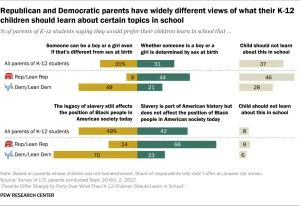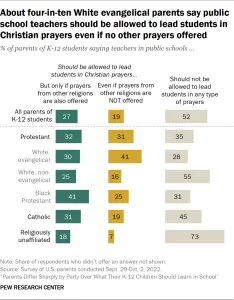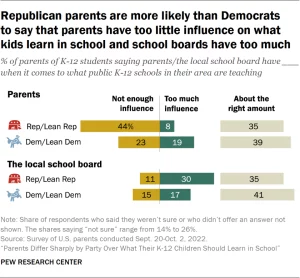Parent eruptions at local school board meetings over the past couple of years are based in real and dramatic differences of opinion about what should be taught in America’s public schools, according to new data from Pew Research.
For example, only 24% of Republican parents want their children to learn in school that the legacy of slavery still affects the position of Black people in American society today.
That likely fuels the harsh critique by conservative parents — aided by several national political campaigns — around what they call Critical Race Theory and “woke” ideology. This critique discredits the idea of systemic racism.
American parents on the whole are twice as likely as Republican parents to want children to be taught there’s a lasting legacy of slavery. And Democratic parents are three times as likely as Republican parents to support teaching about the subsequent effects of slavery.
On a related topic, Republican parents (29%) are three times more likely than Democratic parents (10%) to want children taught that the United States stands above all other countries in the world — a view known as American exceptionalism. On the whole, 66% of American parents prefer their children be taught there are other countries in the world that are as good as or better than the United States.

Despite disagreements about these issues, parents of all political persuasions generally approve of what their children are currently learning in public schools — even if they are wary of public schools as a whole. That finding parallels similar data released earlier this month by Gallup, which found 80% of American parents are satisfied with the education their children are receiving.
Pew found Republican and Democratic parents (58%) are equally likely to say they are extremely satisfied or very satisfied with the quality of the education their children are receiving.
But when it comes to what parents believe that education should include, and how much control parents should have over curriculum, stark divides emerge, as illustrated by the question on teaching about slavery.
Fully two-thirds (66%) of Republican parents would rather their children learn that slavery is part of American history but doesn’t affect the position of Black people today, compared to just 23% of Democratic parents who want the same. That is a 43-point gap in perspectives.
 But it’s not just slavery that divides parental views of education today. Pew also found wide gaps on questions about gender identity, sex education, American exceptionalism and how much influence parents should have on what their children learn at school.
But it’s not just slavery that divides parental views of education today. Pew also found wide gaps on questions about gender identity, sex education, American exceptionalism and how much influence parents should have on what their children learn at school.
Republican parents with children in K-12 schools are about twice as likely as Democratic parents to say parents don’t have enough influence on what is taught. And Republicans are more likely than Democrats to say school boards have too much influence.
On the question of what to teach K-12 students about gender identity, American parents are equally divided — with 31% saying children should learn that whether someone is a boy or a girl is determined by the sex they were assigned at birth, 31% saying children should learn that someone can be a boy or a girl even if that’s different from their sex at birth, and 37% saying their children shouldn’t learn about this in school.
Again, views differ widely based on party affiliation. About half of Democratic and Democratic-leaning parents (49%) say they would prefer that their children learn that someone can be a boy or a girl even if that’s different from the sex they were assigned at birth, compared to 9% of Republican parents and those who lean to the GOP who say the same. Republican parents are also more likely than Democratic parents to say their children shouldn’t learn about this in school (46% vs. 28%).
Despite the fact that it is illegal for public schoolteachers to lead students in sectarian prayers, 19% of American parents (and 29% of Republican parents) believe such prayers should be allowed. Democratic parents are twice as likely as Republican parents to believe — as current law requires — teachers should not be allowed to lead students in any kind of prayer.
White evangelical parents (41%) are most likely to say public school teachers should be allowed to lead students in Christian prayers, even if prayers from other religions are not offered.
The Pew poll inquired about two other issues frequently raised by conservative parents at recent school board protests and in recent school board elections: How much input parents should have over what is taught, and how much time they believe is being spent on core academic subjects.
 Nationwide, Republican parents are twice as likely (44% vs. 23%) as Democratic parents to say parents don’t have enough input on what children are taught in school. And nearly one-third of Republicans believe the local school boards elected to guide public schools have too much influence on what is taught.
Nationwide, Republican parents are twice as likely (44% vs. 23%) as Democratic parents to say parents don’t have enough input on what children are taught in school. And nearly one-third of Republicans believe the local school boards elected to guide public schools have too much influence on what is taught.
These data confirm a common argument made by conservative parents at school board meetings and in political campaigns: That they as parents should have significant input into what is taught to the entire classroom or school. School administrators and teachers counter that it is not possible to customize a curriculum to the wishes of every parent and that no single parent or bloc of parents should have control over what all children are taught.
A second item commonly raised in recent parent protests at school board meetings is about how much time is spent teaching core academic subjects. This criticism often is raised to dispute diversity and inclusion initiatives and usually views the social sciences as less important than reading, writing and arithmetic.
On the whole, American parents of K-12 students think their children’s school spends about the right amount of time on core academic subjects. Fathers (24%) and Republican parents (23%) are more likely than mothers (17%) and Democrats (17%) to say their children’s school doesn’t spend enough time on core academic subjects.
The nationally representative survey of 3,251 U.S. parents of K-12 students was conducted Sept. 20-Oct. 2.
Related articles:
It’s time to stop the insanity that is killing public education | Opinion by Mark Wingfield
Public education declined in U.S. eyes, new survey shows
Who’s behind the nationwide attacks on local school boards over Critical Race Theory?


